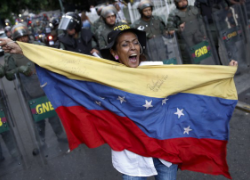Opponents of Venezuelan President Nicolas Maduro continued to protest this past weekend, despite a controversial court ruling limiting protests in the troubled country. The Venezuelan Supreme Court ruling gives police the power to suspend protests that don’t have a permit. The ruling states that Article 68 of the Venezuelan Constitution, which provides for a right of peaceful protest, does not grant an absolute political right to protest. Specifically, the Supreme Court held that political organizations and Venezuelan citizens must exhaust all administrative remedies before potentially being allowed to peacefully protest. Even then, the protests must be pre-approved.
Protests began earlier this year in February amid reports of food shortages and high consumer prices. Current reports from the Central Bank and various economists show that food prices have risen 6.1 percent since February, and that the inflation rate is currently running at nearly 60 percent. These protests have been widely student-driven, but have also included opposition forces.

Often, protests have become violent, and at least 41 people have been killed since they began. Furthermore, almost 600 people have been injured, and around 100 have been detained. According to some who were detained, they were “kicked, pistol whipped, doused with pepper spray and battered with helmets and shotgun butts” in an attempt to discourage further protests. Allegations of murder and other human rights violations have also spread. However, the government’s actions have only made Venezuelan opposition forces more defiant; this weekend’s protests are evidence of just that.
These facts are only recently coming to light in international news, as President Maduro’s government censored most, if not all media coverage of the protests and strife. Due to the rampant censorship, many Venezuelan students turned to foreign sources and social media to have their voices heard. However, reports from late February stated that the Venezuelan government had blocked many Venezuelan users’ Twitter access in an effort to curb further social unrest and protest. Twitter eventually confirmed the government’s supposed actions.
So far, peace talks and negotiations between the Maduro government and opposition forces have not been particularly fruitful. Many students do not trust the current government enough to enable healthy negotiation, as they claim that “years-old efforts” to negotiate with various local, state, and federal officials about problems in Venezuela have solved nothing. There are, however, several hopeful signs. Venezuela’s neighbors are becoming increasingly dismayed with the government’s alleged actions of human rights violations and brutality, leading to more of their involvement in the situation. Recently this month, foreign ministers from the Union of South American nations, which included diplomats from Brazil, Colombia, and Ecuador, pressed both sides into limited negotiation, with the government and opposition forces agreeing to create a commission to investigate supposed human rights abuses during protests. Despite the small improvement, however, protest and opposition in Venezuela do not show any sign of slowing down.
Bailey Woods is a 3L law student at the University of Denver Sturm College of Law and Candidacy Editor for the Denver Journal of International Law & Policy.

